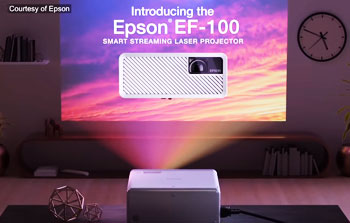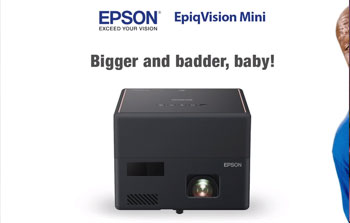Epson’s line of ultra portable projectors includes both the EF-100W and EF-12 models. These mini projectors provide big screen viewing from a compact size.
But should you choose the EF-100W or EF-12 for your needs? We compare the key specs and performance of each below.
A Brief Comparison Table
| Feature | Epson EF-100W | Epson EF-12 |
| Projection Technology | LCD laser | LCD laser |
| Resolution | 1280 x 800 (WXGA) | 1280 x 800 (WXGA) |
| Brightness | 1000 lumens | 1000 lumens |
| Contrast Ratio | 200,000:1 | 2,500,000:1 |
| Throw Ratio | 1.2 | 1.04 |
| Zoom | Fixed | Digital 1.2x |
| Speakers | 2W mono | 2W mono |
| Inputs | HDMI, USB Type A | HDMI, USB Type A |
| Wireless | Yes | Yes |
| Battery Life | Up to 2.5 hrs | Up to 6 hrs |
| Dimensions | 5.7 x 5.7 x 2.2 in | 5.9 x 6.1 x 2.6 in |
| Weight | 2.2 lbs | 2.6 lbs |
Overview of the Epson EF-100W
The Epson EF-100W is an ultra-portable WXGA projector ideal for business travelers. Key features include:

- Compact 5.7″ square design
- Weighs just 2.2 lbs for portability
- Laser light source for bright, colorful images
- Up to 1000 lumens and 200,000:1 contrast ratio
- 1280 x 800 (WXGA) resolution
- 1.2x optical zoom lens
- Vertical keystone adjustment
- Built-in 2W mono speaker
- Wireless connectivity for media streaming
- Up to 2.5 hours battery life
This lightweight laser projector produces a crystal clear 50″ to 150″ image at just 4.5 feet away. Laser illumination provides up to 20,000 hours of virtually maintenance-free use with consistent brightness.
It packs convenient business features like HDMI input, document camera mode, and wireless screen mirroring. The 2W speaker provides enough sound for small presentations.
Overview of the Epson EF-12
The Epson EF-12 mini laser projector is geared toward media streaming at home. Key features:
- Ultra compact 5.9” square chassis
- Weighs 2.6 lbs for portability
- Laser light engine produces 1000 lumens
- 2500,000:1 contrast ratio for deep blacks
- WXGA 1280 x 800 resolution
- 1.2x digital zoom
- Vertical and horizontal keystone
- 2W mono speaker with Bluetooth audio out
- Wireless connectivity and media streaming
- Up to 6 hours battery life
With its sleek design, the EF-12 easily fits in a bag for big-screen viewing anywhere. It produces bright, colorful images up to 150” for movies, sports, and streaming content.
Extensive connectivity includes HDMI, USB, and wireless screen mirroring. Vertical and horizontal keystone correction accommodates off-angle positioning. A 6 hour battery powers through multiple movies or events.
Also Read: Is JVC NZ7 Better Than NZ8?
Key Differences Between the EF-100W and EF-12
While the EF-100W and EF-12 share a highly portable form factor and basic specs, some key differences help distinguish the business-focused EF-100W from the more home media-oriented EF-12:

1. Contrast Ratio: The contrast ratio is a way to measure how different the brightest white is from the darkest black on a screen. Imagine watching a movie with a dark scene – a high contrast ratio means you’ll see the shadows and dark corners more clearly.
The EF-12 shines in this department with an astonishing 2,500,000:1 contrast ratio. In comparison, the EF-100W offers a 200,000:1 ratio. For those who love watching movies or playing games, the EF-12 will give richer, more vibrant images.
2. Zoom Capability: Zooming is about bringing objects closer or pushing them further away without moving the projector. The EF-100W uses an optical zoom lens. Optical zoom is like using a magnifying glass; it gives clearer images.
On the other hand, the EF-12 uses digital zoom, which is like cropping a photo on your phone. Though the EF-100W might have a better zoom quality, the EF-12 offers flexibility with its digital zoom.
3. Keystone Correction: Think of keystone correction as a tool to adjust the shape of the image so that it looks straight, especially when the projector isn’t directly in front of the screen.
Both the EF-100W and EF-12 offer vertical keystone correction, but the EF-12 goes a step further with horizontal keystone correction.
This means you can adjust the image both up-down and side-to-side with the EF-12, giving you more options to get that perfect rectangle.
4. Battery Life: Imagine you’re outdoors, planning a movie night under the stars. Battery life is crucial. The EF-12 comes out ahead, offering up to 6 hours of playback on a single charge.
That’s more than double the 2.5 hours the EF-100W offers. For those on-the-go, this can be a deciding factor.
5. Audio Output: Both projectors have built-in speakers, but sometimes, for that immersive experience, you want more powerful sound. The EF-12 has an edge here. It can connect to external speakers via Bluetooth, turning your room or yard into a mini theater.
6. Wireless Connectivity: In today’s world, wireless connections make life simpler. Both these projectors have WiFi and HDMI, which is great for showing videos or slides. However, the EF-12 takes a leap forward with Bluetooth, allowing you to stream audio effortlessly.
7. Dimensions and Weight: At first glance, both projectors seem similar in size. However, the EF-12 is a tad taller and heavier. The added weight might be due to its extra features, but it’s still incredibly portable.
8. Warranty: Warranties give peace of mind. If you’re investing in tech, you want to be assured it’s covered. Epson recognizes the advanced features of the EF-12, backing it with a 2-year warranty, while the EF-100W has a 1-year warranty.
9. Accessories: Who doesn’t love added extras? With the EF-12, buyers receive a handy travel bag and tripod, making it even more travel-friendly. For the EF-100W, these are separate purchases.
10. Intended Use Case: Both projectors are fantastic, but they cater to different audiences. If you’re a professional needing a tool for presentations, the EF-100W with its document camera mode might be your pick.
For those movie buffs, gamers, and streamers, the EF-12, with its superior contrast and audio capabilities, is a winner.
Also Read: Comparison Between Epson 3200 And 3800 Home Theater Projector.
Frequently Asked Questions (FAQs)
The main differences are that the EF-12 has much higher contrast ratio for deeper blacks (2,500,000:1 vs 200,000:1), longer battery life up to 6 hours, more keystone adjustments, a digital zoom, and Bluetooth support. The EF-100B is geared more for business use while the EF-12 focuses on home media streaming.
No, the native resolution of the Epson EF-12 is 1280 x 800 pixels (WXGA). It does not support full 4K. However, it can accept and downscale 4K input sources to its native WXGA resolution.
The EF-12 mini laser projector has an extremely high contrast ratio of 2,500,000:1. This enables the projector to produce very deep blacks and vivid images, making it well-suited for movie watching and media streaming.
The EF-12 has a native resolution of 1280 x 800 pixels, also known as WXGA or 720p resolution. This allows it to display 720p HD video content in its native resolution. It can accept higher resolutions like 1080p and downsample them to fit its WXGA display.
Watch this review video:
Also Read: Comparison Between XGIMI Horizon and Halo Plus
Final Thoughts
The Epson EF-100W and EF-12 both deliver impressively big, bright images from a highly compact chassis. For mobile business users needing to give straightforward presentations, the EF-100W checks all the key boxes like portability, WiFi connectivity and decent 2.5 hour battery life.
But for media enthusiasts seeking maximum contrast and wireless streaming versatility, the EF-12 stands out with its incredible 2,500,000:1 contrast, 6 hour battery, and useful features like digital zoom and Bluetooth audio.
For larger viewers or more versatile projection, the EF-12 takes the lead despite costing a bit more. But both models provide an easy way to project a big vibrant display anywhere without the bulk of traditional projectors.
